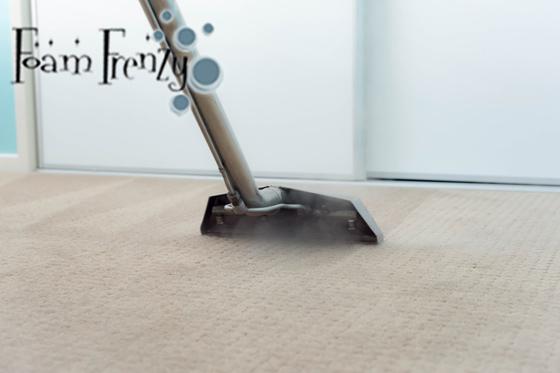Although water is necessary for steam cleaning, too much of it can prove harmful to your carpet fibers. One of the cleaning methods that is actually bad for your carpet is hot water extraction. You might think that it is beneficial, as a lot of professionals use it for cleaning carpets. However, it could not be further from the truth. Instead, the benefits of foam cleaning will make you realize that it is the best option. It uses a gentle Eco-Friendly cleaning solution, which works well for the best cleaning results. During the cleaning process, the foam is powerful enough to clean your carpets, but is not too toxic or harsh like other cleaning agents.
If you decide to opt for hot water extraction, you should know that it could ruin your carpet. This blog post aims to help you understand just how bad hot water extraction and chemical cleaning solutions can be for your carpet.
What Is Hot Water Extraction?
For those of you that don’t know, hot water extraction is a cleaning method that utilizes advanced equipment to spray heated water onto the carpet and uses cleaning chemicals to soak into your carpet to absorb the dirt and dust. Then, the water is vacuumed up and other grime is dislodged to eliminate debris or stains. Even though most people think that hot water extraction is the best carpet cleaning method, it has its fair share of limitations and can be rather harmful for your carpet in the long run.
Why Is Hot Water Extraction Not a Good Idea?
The following reasons explain why hot water extraction should be avoided.
1. Uses Too Much Water
When it comes to carpet cleaning methods, hot water extraction leaves too much water and tends to be left beneath the carpet, which causes mold, mildew and over-saturation. Besides, too much water is dangerous if it is around buildings with HVAC, wiring, or technology. If you are someone who cares about the environment, it is important that you opt for a more eco-friendly option such as foam cleaning. The differences can be drastic also for small pets who ingest detergent from the upholstery or after carpet cleaning services.
2. Takes Too Much Time to Dry
Since extraction requires a lot of water, your carpet would take a lot of time in order to dry. In fact, it would have to be dried multiple times to compare it to the foam cleaning agent that we use here at Foam Frenzy. Generally, it will take up to three times as long. However, the carpet would require anywhere from 8 to 24 hours to dry. This is why it would be difficult for you to manage everything, as your carpet is left drying. Hence, it is not the best option for homes and offices.
3. Further Contaminates the Carpet
As the entire carpet would remain soaked for hours, it can become a breeding ground for fungus and bacteria. Hot water extraction is likely to increase the growth of microbial content by as much as 150%. Therefore, it would have a negative impact on your health overtime, especially if you are prone to allergies.
4. Causes Long-Term Damage
When there is too much water, it ends up damaging your carpet or fabrics on the furniture. The padding system would degrade due to over-saturation and result in seams raveling and the backing separating from your carpet. The high-pressure water and high heat shouldn’t be underestimated for damage to your carpet. If you have ever replaced your flooring and installed a new carpet in your home… You know exactly what old padding and carpeting looks like when you rip up the materials. Homeowners are often surprised to find what germs have been living right beneath their own feet for years.
Choose Foam Frenzy
Now that you know just how harmful hot water extraction is, you need to consider the benefits of foam cleaning. Please feel free to go through our customer reviews and read about our business. The importance of customer service and referrals means everything to us.
At Foam Frenzy, we provide the best foam cleaning service for your needs. You can rest assured knowing that we will prevent carpet problems by using only low moisture carpet cleaners. You can book an appointment today here.


